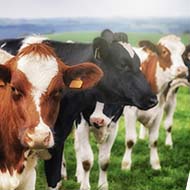
Researchers trace outbreak in East Cumbria to a single source.
New research led by the University of Edinburgh's Roslin Institute has suggested the use of genetic contact tracing to identify the source of bovine tuberculosis (bTB) outbreaks.
The paper, published in the Journal of Applied Ecology, comes in response to an increase in bTB rates among wildlife in East Cumbria with no previous infections.
Researchers analysed the DNA of the bacteria that causes the disease taken from badgers and cows that had tested positive. They found that the bacteria were closely related, suggesting that a single herd of cattle was the most likely source of infection.
Scientists believe that routinely monitoring badgers and cows could help in the early management of disease outbreaks. Control measures in England alone cost a staggering £100 million every year.
“This was an unusual outbreak in that we were able to trace the infection to a single source – as close to a smoking gun as you can get,” commented lead investigator Professor Rowland Kao, chair of veterinary epidemiology and data science at the Roslin Institute.
“Badgers are becoming more populous, and farms are becoming bigger and more complex, so the risk of disease spreading from livestock to wild animals will probably persist and even increase as these trends are likely to continue into the future. Our findings are very useful for understanding transmission of TB, and infection spread in general.”
The study used a tracking method that integrated genetic information with spatial locations and contact tracing, which enabled researchers to compare small changes in DNA as it spread from animal to animal.
The team found that the outbreak started with an infected cow brought to a farm from Northern Ireland. The disease passed among cattle, infecting an increasing number of cows, then spread throughout the local badger population before transmitting back to cows in a cycle of infection.
Experts believe the novel approach could be an effective way to model disease spread and may lead to a greater understanding of the transmission of other diseases.



 The Veterinary Medicines Directorate (VMD) is inviting applications from veterinary students to attend a one-week extramural studies (EMS) placement in July 2026.
The Veterinary Medicines Directorate (VMD) is inviting applications from veterinary students to attend a one-week extramural studies (EMS) placement in July 2026.